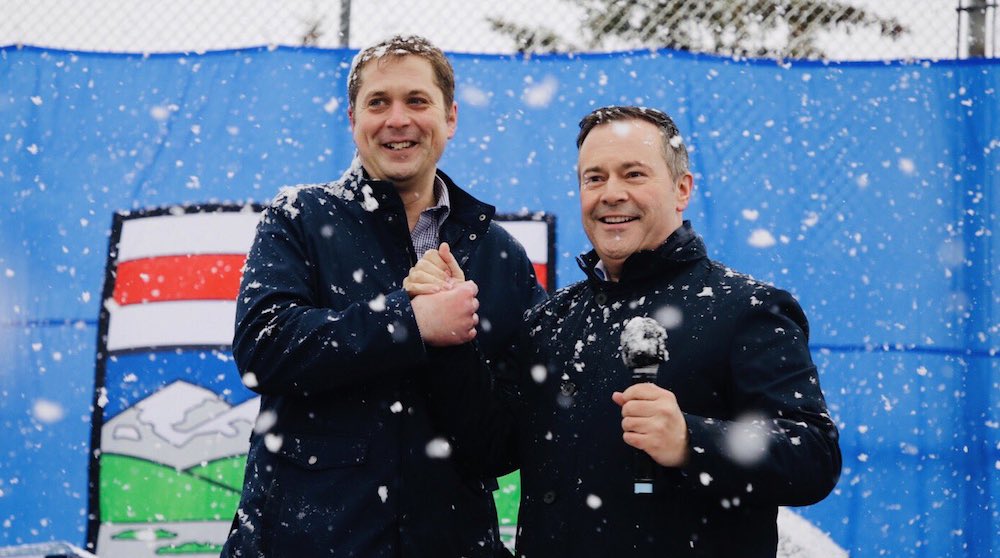Jason Kenney will be sworn in tomorrow as the 18th premier of Alberta, so we should know very soon if he really meant his oft-repeated pledge to make the repeal of the NDP’s carbon levy the first act of his government, or if it was just another campaign whopper.
Likewise, with Canada creeping into the hot zone before a federal election, we may soon have the opportunity to test the veracity of Prime Minister Justin Trudeau’s assertion in November 2016 that approval of the Trans Mountain pipeline expansion would not and could not have happened without the departing Alberta NDP government’ carbon tax and its cap on oilsands emissions, which Kenney has also promised to eliminate.
Backsliding is always possible in politics, of course, and there might be sound reasons for it on both sides in the current situation, but right now we seem to be headed for an intramural game of chicken between Ottawa and Edmonton.
So far, leastways, Kenney has not wavered in his public determination to make axing the C-tax the first piece of legislation he brings before the Alberta legislature.
Nor has he wavered on other aspects of what is already coming to be called in other provinces his “revenge platform,” including immediately enacting the NDP’s unconstitutional “turn off the taps to B.C.” legislation and joining the hopeless courtroom grandstanding by other Conservative governments based on the unlikely notion Ottawa’s carbon tax is unconstitutional.
Meanwhile, “sources” close to the prime minister are dropping hints in the national press that the federal Liberals are “actively considering” blocking expansion of the TMX if Kenney goes ahead with blowing up the carbon tax, removing the 100-megatonne carbon cap, and implementing other parts of the ecocidal Kenney-Conservative agenda.
“The logic is that if there is no climate change plan, there can be no more pipelines,” columnist John Ivison wrote in the National Post on Thursday. That, he noted, “would likely play well in British Columbia and Quebec, where the Liberals believe they can pick up seats in the October election.”
Indeed it would, and even appearing to let Kenney’s plans slip through could be disastrous for the Liberals in those two jurisdictions. At the very least, we could expect a bonus for Elizabeth May’s Greens on the West Coast in October if Trudeau doesn’t stand up to Kenney’s bluster, and even a respite for the federal NDP led by Jagmeet Singh.
The PM also has to know that if he does permit Kenney’s agenda to proceed unhindered, the new Alberta premier will loudly proclaim it as a huge victory, evidence of the federal Liberals’ weakness and the bankruptcy of the whole “social license” approach to balancing environmental and economic interests.
So it’s this simple: If Kenney goes ahead as promised and Trudeau approves the pipeline anyway, the PM’s path to victory in the fall is very narrow; if he withdraws approval, or even kicks the can down the road, he has a much wider path to another term.
Yeah, no Liberals will be elected in Alberta and the local media will go into hysterics, but so what? Voters have already made up their minds in this province, and local columnists have already slipped over the edge!
On the other hand, the instant Trudeau announces the TMX is dead, he has lost any possibility he might restrain or influence Kenney, who will presumably then try to provoke a constitutional crisis by attacking B.C.’s economy in ways we have never seen before in Canadian history. Still, there’s only so much you can do without an army.
So my guess is that notwithstanding the Post’s claim Mr. Trudeau is “itching for a fight,” the federal government’s response will be to plead a need for more study and put off making a decision on the TMX until after the federal election, thereby eating its cake and having it too.
Moreover, as blogger Susan Wright pointed out yesterday, there’s no guarantee federal Opposition leader Andrew Scheer would do much more for Kenney than Trudeau will. After all, the federal Conservative Party faces the same electoral math problem as the Liberals, in reverse. “The federal Conservatives could win every seat west of Ontario and Scheer would still need 63 seats from central Canada and the Atlantic provinces to form government,” she wrote.
Meanwhile, regardless of what happens with the TMX, there is another game afoot as well: the Liberal government’s desire to remain Canada’s natural governing party and Kenney’s obvious ambition to return to Ottawa in prime ministerial triumph.
For Kenney’s ambition to be realized, the federal Conservatives must lose the 2019 election to Trudeau — else the ambitious Alberta premier and the rest of us might be stuck with several years of Scheer as prime minister. Talk about an unappealing prospect all ’round!
This presents some interesting problems for Kenney. He can’t appear to be too unenthusiastic about a Conservative victory in 2019 without ruining his prospects for inheriting the mantle of national party leadership afterward. Nor can he seem to be too accommodating to Trudeau.
I imagine Kenney was as pleased as Trudeau, therefore, to see recent polling that shows the Liberals finally closing the gap on Scheer’s Conservatives now that Jody Wilson-Reybould and Jane Philpott are gone from cabinet and the Liberal caucus and the SNC-Lavalin brouhaha seems to be receding into the past.
David Climenhaga, author of the Alberta Diary blog, is a journalist, author, journalism teacher, poet and trade union communicator who has worked in senior writing and editing positions with The Globe and Mail and the Calgary Herald. This post is also found on David Climenhaga’s blog, AlbertaPolitics.ca.
Photo: Andrew Scheer/Twitter
Help make rabble sustainable. Please consider supporting our work with a monthly donation. Support rabble.ca today for as little as $1 per month!




